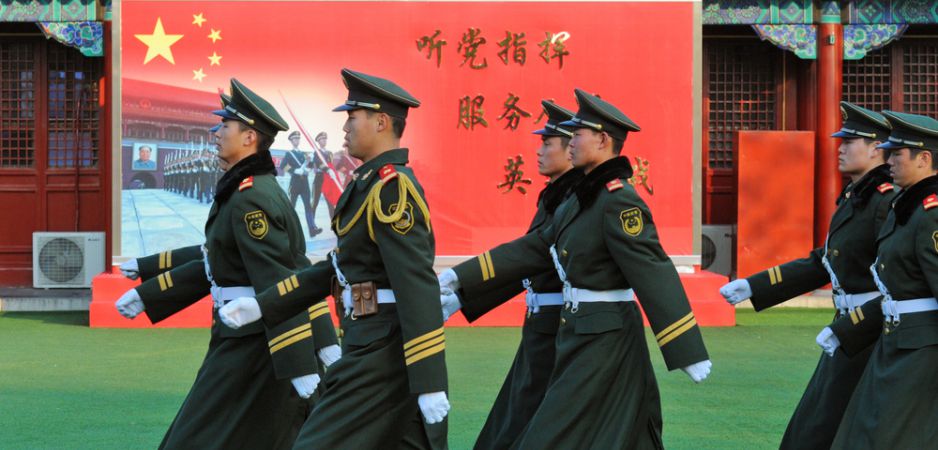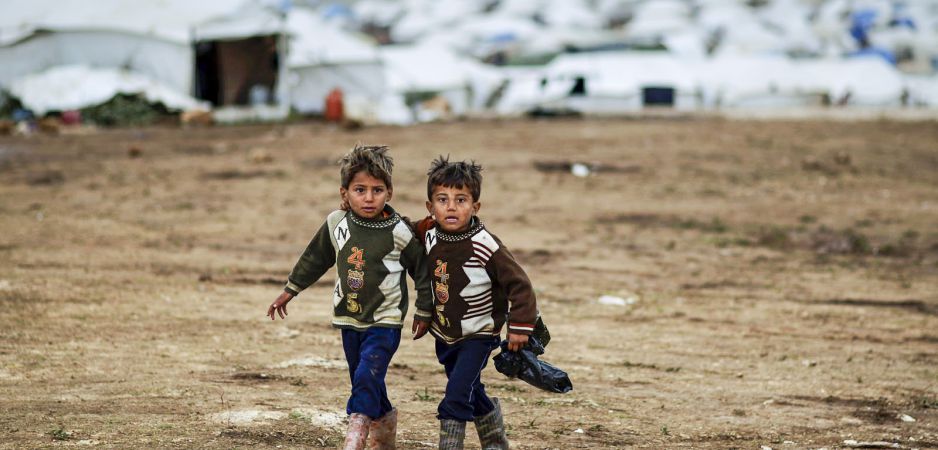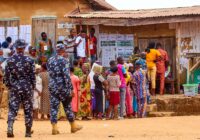Living in any society involves a curtailment of liberty, but citizens in each era have to make informed choices about which freedoms to give up and why.
This week, the US Congress passed the USA FREEDOM Act or, to use its complete name, “Uniting and Strengthening America by Fulfilling Rights and Ending Eavesdropping, Dragnet-Collection and Online Monitoring Act.” Written in convoluted legalese, this piece of legislation modifies existing legislation to establish a new process through which the US government can obtain business records to protect Americans against terrorism and to carry out intelligence activities. Representative Jim Sensenbrenner, who once sponsored the USA PATRIOT Act, was a co-sponsor of this new act. In his words, the purpose of the new act is “to rein in” the US government, which had exceeded the powers assigned to it by the USA PATRIOT Act.
Sensenbrenner is a Republican who represents Wisconsin’s richest district. He went to a private high school and then graduated from Stanford, the uppity expensive school on the West Coast that has set out to rival Harvard. Sensenbrenner has been in the House of Representatives since 1978 and tried to impeach the philandering Bill Clinton for his dalliance with Monica Lewinsky. Needless to say, it is no surprise that the venerable Sensenbrenner was the man who introduced the USA PATRIOT Act in the Congress on October 23, 2001. What is surprising is that even Sensenbrenner was aghast by an “out of control” National Security Agency (NSA) that answers to President Barack Obama, a Democrat who once wanted to close down the infamous Guantanamo Bay Detention Camp.
The Justice Department blurb about the USA PATRIOT Act is that it is all about preserving the life and liberty of Americans by protecting them against terrorism. A full reading of this act reveals that it gives far too much power to the government without adequate legislative oversight or judicial review. It was drafted in the post-9/11 paranoia that gripped the United States. Not since the British burnt the White House on August 24, 1814, had the mainland of the US been attacked so spectacularly. Even Pearl Harbor happened a long way away. So, a hysterical overreaction was inevitable, but the fact that the act was repeatedly renewed without discussion or debate is frightening.
Parts of the USA PATRIOT Act, including the infamous section 215 that gave the NSA the power to collect phone records of millions of Americans, were due to expire on June 1, 2015. Mitch McConnell, the Senate Majority Leader, put senators under the gun by delaying the discussion on the USA PATRIOT Act to the last minute. He wanted them to vote for the act in its entirety. Senator Rand Paul killed this planned extension by attempting a filibuster, a procedure that allows legislators to delay or prevent a vote on a bill by giving unending speeches. Paul spoke for 10 hours and 31 minutes, claiming that this was a time when “fear and complacency allow power to accumulate and liberty and privacy to suffer.”
Paul, who is running for president, is right about fear and complacency. Those in power are afraid and the voters don’t care. John Oliver, the Englishman from humble roots who made it to Cambridge and has now become a cultural icon in the US, captured the complacency that Paul refers to in his inimitably witty show. As he pointed out, few Americans know about Edward Snowden, the man who created the brouhaha about the US government snooping on its own citizens by revealing NSA activities in 2013. News shows interrupt legislators discussing the infamous section 215 to feature Justin Bieber.
The fundamental issue here is liberty. This has always been a tricky idea. For instance, most of us have the freedom to listen to music. However, even in the most laissez faire societies, listening to loud music at 1am is not quite welcome. Living in any society involves some curtailment of freedom, even something as basic as listening to music. The state formalizes this implicit restraint on freedom through law. There are many arguments for curtailing individual freedoms. Those like Thomas Hobbes have a grim view of the world and believe that life is “nasty, brutish and short” in the absence absolute power in the hands of a sovereign. Executive authority forges order out of chaos. Such a view is particularly popular in places like Russia and Saudi Arabia.
Yet others with a more benign view of human nature believe that individuals can manage to live harmoniously together without the heavy hand of the state. The idea of liberty or freedom has been powerful enough to inspire people like Mahatma Gandhi and Nelson Mandela. In the words of Isiah Berlin, a great philosopher of the 20th century, freedom is a protean word with “more than two hundred senses of it recorded by historians of ideas.” It goes without saying that each era demands a fresh discussion on freedom because the changing nature of power raises new questions.
For instance, do mood experiments by Facebook constitute fetters on the freedom of their users? Most of the over 1.4 billion people from around the world who actively use Facebook are probably fine with the company’s use of their personal information. At some level, they know that they are putting billions into Mark Zuckerberg’s pockets. Yet have they agreed to be manipulated by Zuckerberg’s bright young things from elite American schools like Harvard? If they fail to read Facebook’s data policy, does that mean they have signed away their privacy and freedom to own their information? When Facebook’s expensive lawyers change its terms of use to increase the company’s profits, is that an intrusion on the freedom of the people who sign-up for Facebook?
Similar questions pertain to the NSA, which has access to records of emails, phone calls and all kinds of personal information. Does the NSA need a bulk collection of private data to protect US citizens? In fact, the bigger question pertains to what is it that comprised protecting US citizens and what the government can and cannot do. Jon Stewart, the sage in motley whom many Americans trust for their news, rightly points out the ridiculous inconsistencies in American discourse. Extending health care is executive overreach, but spying on citizens is fine. Even as parts of the USA PATRIOT Act expired, the USA FREEDOM Act promptly renewed the expired parts with some token safeguards.
Paul’s filibuster generated headlines but not debate. There are key questions that remain unanswered. What is the balance between liberty and security? What do the two words even mean today? Do the unalienable rights of “Life, Liberty and the pursuit of Happiness” imply access to a healthy life or just safety from a terrorist attack?
In Nigeria, such questions are staring Muhammadu Buhari, the newly elected president, in his face. An Amnesty International report found that the Nigerian military had detained 20,000 boys and men since 2009. Of these, 7,000 are dead. This means that of the 17,000 people killed in northeast Nigeria since 2009, the military is responsible for 41% of the deaths. The Nigerian military has claimed the report is “biased and concocted.” It makes the same argument that the NSA does to avoid scrutiny and retains its powers. The military is merely operating to “save citizens from abuse of their rights by mindless terrorists.” These are arguments that governments in countries like Russia, Egypt and Pakistan routinely parrot.
Governments have long sought greater powers to fight wars and defeat terrorists. During both World Wars, even democracies curtailed liberty significantly. In the US, 127,000 citizens of Japanese descent found themselves in concentration camps. They lost their property and possessions but, unlike the Jews in Nazi Germany, they largely escaped with their lives. The McCarthy era during the height of the Cold War is notorious for the US version of Soviet purges when many upstanding Americans were hounded out of their jobs. Those deemed ideologically suspect suddenly found their lives and livelihoods under threat. Seven years ago, the British government spuriously used anti-terrorist legislation to take over Icelandic bank assets at the height of the financial crisis.
Americans would do well to remember that King George III considered George Washington to be a terrorist and their government considered Nelson Mandela the same. Terrorism more often than not has political, social and economic roots. Addressing them takes time, energy and money. More importantly, it requires the kind of wisdom that Britain, Ireland and the US demonstrated when bringing peace to Northern Ireland. It is high time for an honest conversation not only on liberty and security, but terrorism and war.
*[You can receive “The World This Week” directly in your inbox by subscribing to our mailing list. Simply visit Fair Observer and enter your email address in the space provided. Meanwhile, please find below five of our finest articles for the week.]
[seperator style=”style1″]Kurdish Movement Can Save Turkey’s Democracy [/seperator]
As Turkey gears up for its tightest election in years, could the Kurdish political movement be the great hope for Turkey’s democracy?
On June 7, Turkey will head to the polls in a general election of seismic importance to the country’s democratic future. The incumbent Justice and Development Party (AKP), already assured of securing the highest share of the popular vote for the eighth consecutive campaign, is seeking a parliamentary super-majority that would enable it to push through changes that would see President Recep Tayyip Erdogan monopolize power in a strengthened executive role, which critics say would undermine Turkey’s already beleaguered democratic system.
Erdogan, the uncompromising strongman of Turkish politics, is calling for a revamped presidential system that would allow him to work without the troublesome constraints imposed by Turkey’s pesky constitution and judiciary. However, his dreams of an executive super-presidency increasingly look like they might be frustrated by the burgeoning People’s Democracy Party (HDP), which has its roots in the Kurdish political… Read more
[seperator style=”style1″]US Presidential Candidate’s Foreign Policy Bombshell [/seperator]
US Senator Rand Paul’s statements on foreign policy were a huge shock to the system for the Republican Party.
Republican presidential hopeful Senator Rand Paul has finally done the unthinkable: He has opened Lemarchand’s Box and sparked one of the most critical foreign policy debates, which has been avoided since the rise of the Islamic State in 2014. Namely, who is responsible for what is happening in Iraq and Syria? Not only did he directly blame the more hawkish wing of the Republican Party, but he also claimed that they have been wrong about most foreign policy for the past 20 years — cue rancorous indignation.
While this might just be a political strategy or an attempt to distinguish himself from a crowded field of presidential candidates, one unequivocal fact remains and it is something that all people who have lived and worked in Iraq already know: The Islamic State, along with its predecessors, was a result of decisions made during the US… Read more
[seperator style=”style1″]China’s Military Base in Djibouti Exposes US Decline [/seperator]
China is negotiating the building of a military base in Djibouti—the latest sign that Beijing has started to flex its military muscle.
“I see only one country in the world that has a global strategy today, and it’s not America. It’s China,” remorselessly quipped Ian Bremmer, president of the Eurasia Group, during a conference on May 27. His scathing remarks were part of a wide-ranging conversation on China’s rise and the threats posed by what he dubbed an “incoherent America.” But are such fear-mongering thoughts warranted? Sadly, they are.
Under the leadership of President Xi Jinping, China has embarked on a global war for the economic hearts and minds of leaders worldwide, as part of the so-called Silk Road Economic Belt and the Maritime Silk Road Initiative. This $140 billion plan aims at building a sphere of economic influence, targeting trade routes all the way from the east coast of China to the Middle East, up through Europe and East Africa… Read more
[seperator style=”style1″]At What Point Do We Lose Our Empathy? [/seperator]
The problem is not our empathy, but the apathy created by our inability to do anything about our emotion.
There is no waiting space inside the Dar es Salaam airport, departure passengers sit outside to wait for their flights. It was on these uncomfortable benches, while eating Pringles and reading my Kindle, that I met him.
He approached me slowly. I attempted to avoid eye contact because I still have a woman’s fear of strange men, but he smiled at me and held up a laminated sign: “Please help us travel to play football. I am deaf. Support the Tanzania Federation of Sports for the Deaf.”
I hesitated. He sat down next to me, gesturing, and I read through legal documents he was carrying that showed the Tanzanian Deaf Football team were traveling for an East Africa Cup game and required funding.
He smiled at me again, writing, “I help clean for team” on a stray piece of paper. I had no cash with… Read more
[seperator style=”style1″]Flight of the Rohingya [/seperator]
The realities that over 150,000 Rohingya refugees face are filled with risk, fear and uncertainty.
Imagine the choice between throwing your fate into the hands of notoriously abusive human traffickers or staying in a place facing the highest risk of genocide in the world. This is the choice faced by hundreds of thousands of people from the Rohingya minority in western Burma, or Myanmar, today.
The reality of their trials was brought to life for me recently in a crowded home of refugees in Malaysia, where an estimated 100,000 Rohingya have now fled. Each has a slightly different story, but the following accounts are fairly typical.
Stage 1: Intimidation and Poverty
Salim, a 30-year-old fish and vegetable trader in western Burma, is detained by local authorities and beaten—not for any crime, but for choosing to self-identify as a “Rohingya” during the 2014 census. The government of Myanmar denies the existence of Rohingya, choosing to label them as undocumented “Bengalis” from neighboring Bangladesh… Read more
The views expressed in this article are the author’s own and do not necessarily reflect Fair Observer’s editorial policy.
Photo Credit: Digidreamgrafix / Denniro / Shutterstock.com
 We bring you perspectives from around the world. Help us to inform and educate. Your donation is tax-deductible. Join over 400 people to become a donor or you could choose to be a sponsor.
We bring you perspectives from around the world. Help us to inform and educate. Your donation is tax-deductible. Join over 400 people to become a donor or you could choose to be a sponsor.
Support Fair Observer
We rely on your support for our independence, diversity and quality.
For more than 10 years, Fair Observer has been free, fair and independent. No billionaire owns us, no advertisers control us. We are a reader-supported nonprofit. Unlike many other publications, we keep our content free for readers regardless of where they live or whether they can afford to pay. We have no paywalls and no ads.
In the post-truth era of fake news, echo chambers and filter bubbles, we publish a plurality of perspectives from around the world. Anyone can publish with us, but everyone goes through a rigorous editorial process. So, you get fact-checked, well-reasoned content instead of noise.
We publish 2,500+ voices from 90+ countries. We also conduct education and training programs
on subjects ranging from digital media and journalism to writing and critical thinking. This
doesn’t come cheap. Servers, editors, trainers and web developers cost
money.
Please consider supporting us on a regular basis as a recurring donor or a
sustaining member.
Will you support FO’s journalism?
We rely on your support for our independence, diversity and quality.













Comment